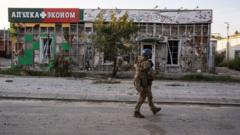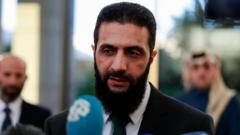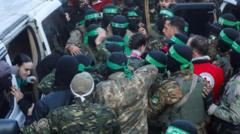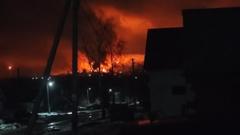Kim Jong-un's military aid to Russia highlights North Korea's precarious positioning in a shifting geopolitical landscape.
**North Korea's Military Support to Russia: Opportunities and Risks**

**North Korea's Military Support to Russia: Opportunities and Risks**
North Korea's alliance with Russia involves troop deployment and armaments, offering strategic benefits amid significant economic challenges.
In a decisive diplomatic maneuver, North Korea, under the leadership of Kim Jong-un, has committed an estimated 11,000 troops along with substantial weaponry to bolster Russia's military efforts in the ongoing war against Ukraine. This unexpected partnership has come at a time when Russia is keen to restore lost ground in occupied territories, particularly within the Kursk region. Pentagon spokesman Maj. Gen. Pat Ryder confirmed that North Korean soldiers have suffered casualties in the operations there.
The military support offers North Korea a lifeline, providing essential funding and enhancing its diplomatic clout. Analysts suggest that Kim is poised to gain billions of dollars in food, oil, cash, and advanced weaponry from Russia, crucial resources that could fortify his regime against the ongoing effects of international sanctions. These sanctions, imposed by the U.S. and other nations, have crippled North Korea's economy by limiting its major exports, including coal and textiles, and drastically reducing its oil imports.
Recent years have presented a trifecta of challenges for the North Korean regime. The combination of U.N. sanctions, faltering diplomatic relations with the U.S., and the pandemic's economic repercussions has eroded Kim's public image. His outreach efforts to former President Donald Trump from 2018 to 2019 ended in failure, heightening internal pressures on his regime as economic hardships intensified.
With the conflict in Ukraine ongoing, North Korea finds itself in a position where it can leverage its military capabilities—boasting one of the largest conventional forces in the world at 1.3 million strong. The country's ample reserves of artillery and antiquated missile systems are poised to fill the gaps in Russia’s supply chain. The closeness of this alliance began with North Korean summits, such as the invitation extended to Russian Defense Minister Sergei Shoigu to observe a weapons parade last July. Consequently, arms shipments to Russia ramped up, culminating in a bilateral summit where Kim was shown potential exchanges, from a space launch facility to naval assets in Russia.
This burgeoning relationship presents both opportunities and inherent risks for North Korea. While the short-term benefits are clear in terms of economic support and enhanced military collaboration, the long-term implications of deeper ties with Russia amidst global isolation could lead to unforeseen consequences for Kim's regime as geopolitical tensions mount.
The military support offers North Korea a lifeline, providing essential funding and enhancing its diplomatic clout. Analysts suggest that Kim is poised to gain billions of dollars in food, oil, cash, and advanced weaponry from Russia, crucial resources that could fortify his regime against the ongoing effects of international sanctions. These sanctions, imposed by the U.S. and other nations, have crippled North Korea's economy by limiting its major exports, including coal and textiles, and drastically reducing its oil imports.
Recent years have presented a trifecta of challenges for the North Korean regime. The combination of U.N. sanctions, faltering diplomatic relations with the U.S., and the pandemic's economic repercussions has eroded Kim's public image. His outreach efforts to former President Donald Trump from 2018 to 2019 ended in failure, heightening internal pressures on his regime as economic hardships intensified.
With the conflict in Ukraine ongoing, North Korea finds itself in a position where it can leverage its military capabilities—boasting one of the largest conventional forces in the world at 1.3 million strong. The country's ample reserves of artillery and antiquated missile systems are poised to fill the gaps in Russia’s supply chain. The closeness of this alliance began with North Korean summits, such as the invitation extended to Russian Defense Minister Sergei Shoigu to observe a weapons parade last July. Consequently, arms shipments to Russia ramped up, culminating in a bilateral summit where Kim was shown potential exchanges, from a space launch facility to naval assets in Russia.
This burgeoning relationship presents both opportunities and inherent risks for North Korea. While the short-term benefits are clear in terms of economic support and enhanced military collaboration, the long-term implications of deeper ties with Russia amidst global isolation could lead to unforeseen consequences for Kim's regime as geopolitical tensions mount.





















